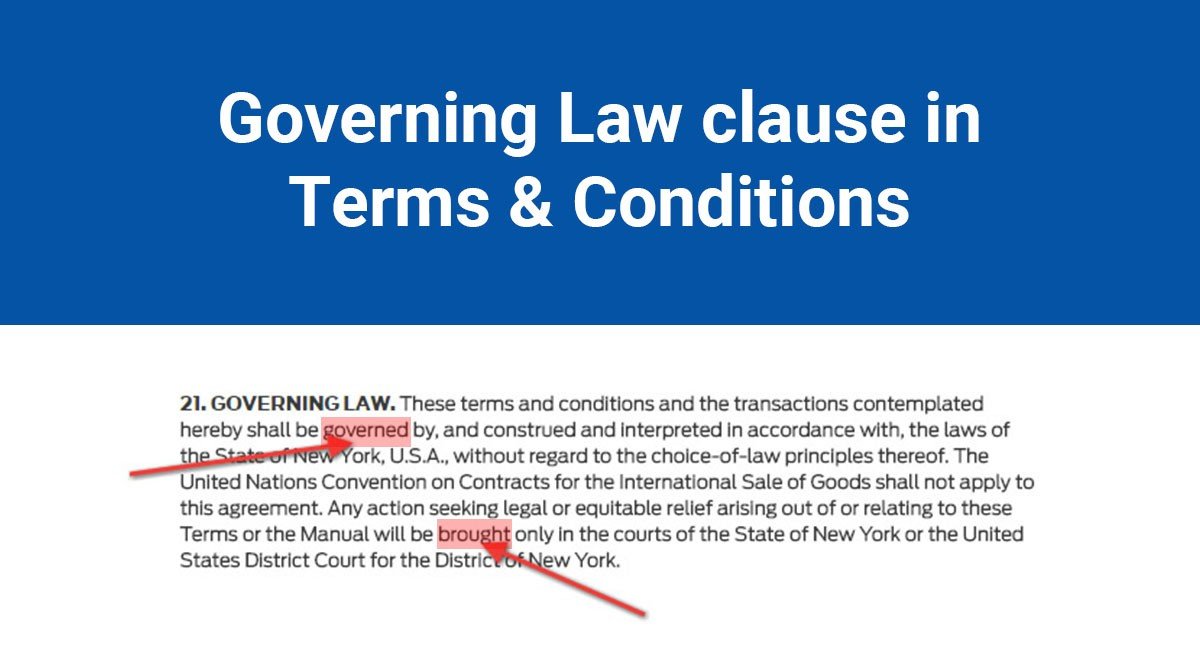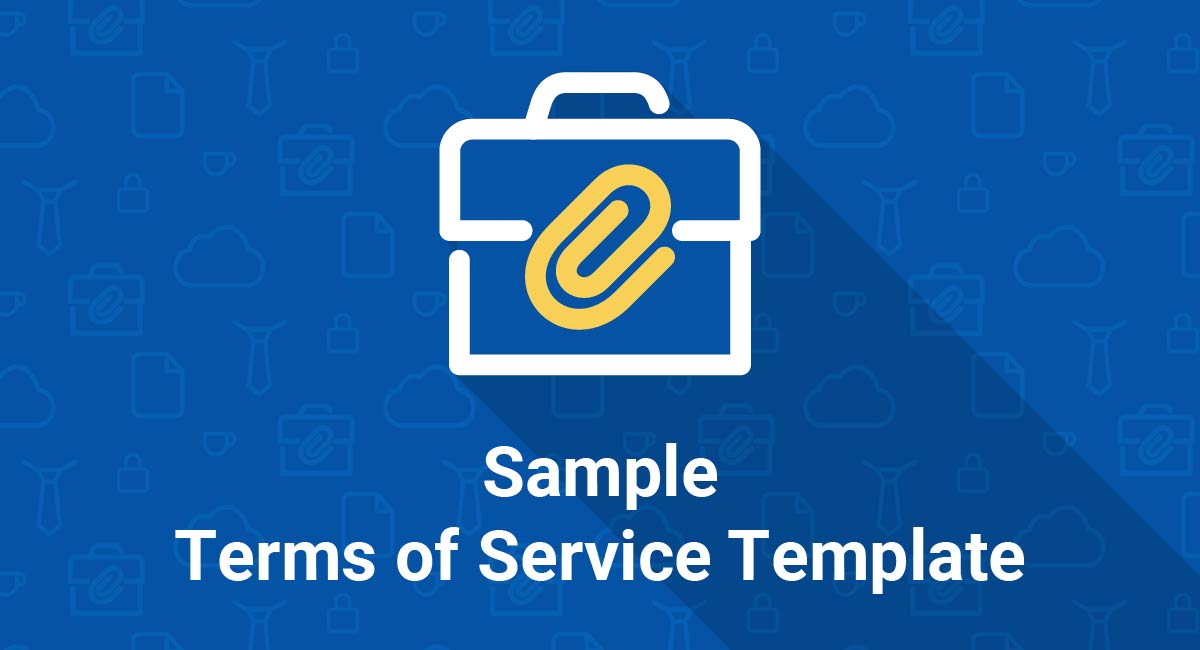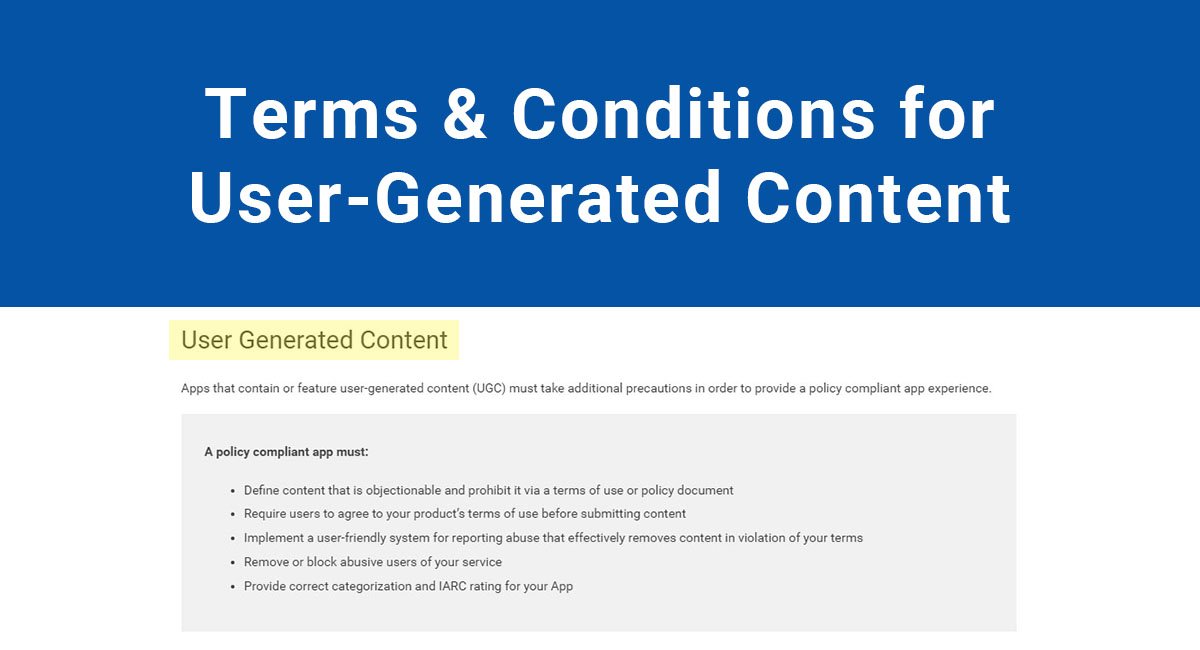A "Governing Law" clause is a clause used in legal agreements where you can declare which rules and laws will govern the agreement if legal issues arise.
A "Governing Law" clause will be found consistently in contracts and legal agreements between companies and their users. You can typically find these clauses in standard Terms and Conditions agreement for websites or mobile apps.
The more geographic reach your company has, the more important this clause will become.
For example, if you're a small local business dealing 100% exclusively with locals, you may not really need a clause telling your customers which law applies. Everyone will expect it to be the law of whatever state that little local business is in.
Now, take a big corporation with customers and offices in numerous countries around the world.
If a customer in Japan wants to sue over an issue with the product, would Japanese law apply or would the law from any of the other countries take over? Or, what if you're a U.S.-based SaaS business that has customers from Europe.
In both cases, a governing law clause will declare which laws will apply and can keep both companies from having to hire international lawyers.
The governing law can be of a particular state for agreements in the U.S., or of a specific country if an agreement is international in nature. While most U.S. state laws are pretty streamlined from state to state, laws differ drastically from country to country so this is an especially important clause in Terms and Conditions with customers all over the world.
While you do get to declare which state's or country's laws you'd like to use, you can't really just choose anywhere.
Courts will look at the governing law selected in your agreement and then look for some sort of connection between that location and either:
- The transaction or part of the transaction, or
- At least one of the parties.
A list of potential states that could be used will include the state of residence of each of the parties, where the transaction took place, where your company is incorporated, and other factors.
Why a Governing Law clause is useful to include in your Terms and Conditions
A Governing Law clause is mostly useful because it helps clarify your terms to your users. As always, the more information you can provide to your users about the terms they're agreeing to, the better.
It's also useful in that it helps save time and money on any litigation that may arise because you won't have to deal with establishing the governing law.
Governing Law vs. Jurisdiction
Don't confuse governing law with jurisdiction.
Jurisdiction refers to what court or court system your case will physically be tried in. For example, a jurisdiction can be something like, "state courts of New York" while governing law will be something like, "state laws of New York."
Note that any Governing Law can be applied to any jurisdiction. Your governing law clause and jurisdiction clause don't have to match. You can apply Florida governing law in a court case where only Vermont state courts have jurisdiction, for example.
A lot of businesses add jurisdiction information in their governing law clause rather than having two separate clauses.
Here's how Apple combines this information in its Terms of Use.

Examples of Governing Law clauses
Here are some examples of governing law clauses used in the legal agreements of websites and mobile apps. Even though you can choose your governing law, sometimes a business may opt not to choose just yet.
Native Union's Terms of Use maintains a lot of control over legal matters by creating a very broad jurisdiction clause. This clause retains the right of Native Union to determine case by case which country, state, province or territory will get jurisdiction.
Basically, they're saying that there is a governing law, and that it will be determined by them at some time in the future:

Amazon, which operates in countries all over the world, has a different governing law clause for each country's service. Here's an example from Amazon U.S. and its Conditions of Use agreement.
The "Applicable Law" clause declares the laws of the state of Washington to apply in any disputes between itself and a U.S. user.

In the Amazon UK Conditions of Use and Sale agreement you'll find the same clause - "Applicable Law" - but with different country-specific information. Links are provided to make things more convenient for users:

When you look at the Instagram Terms of Use you'll notice right away that the laws of California are set as the governing law in the very first sentence of the clause. The clause ends with jurisdiction information, naming Santa Clara, California state and federal courts as having exclusive jurisdiction:

Here's an example of a really thorough governing law clause that works well for a large international business or SaaS app that has users all over the world.
Spotify combines its governing law and jurisdiction information into the same clause, using a two-columned chart. A user can easily locate which country he's in within the chart and see what the choice of law and jurisdiction will be for that country.
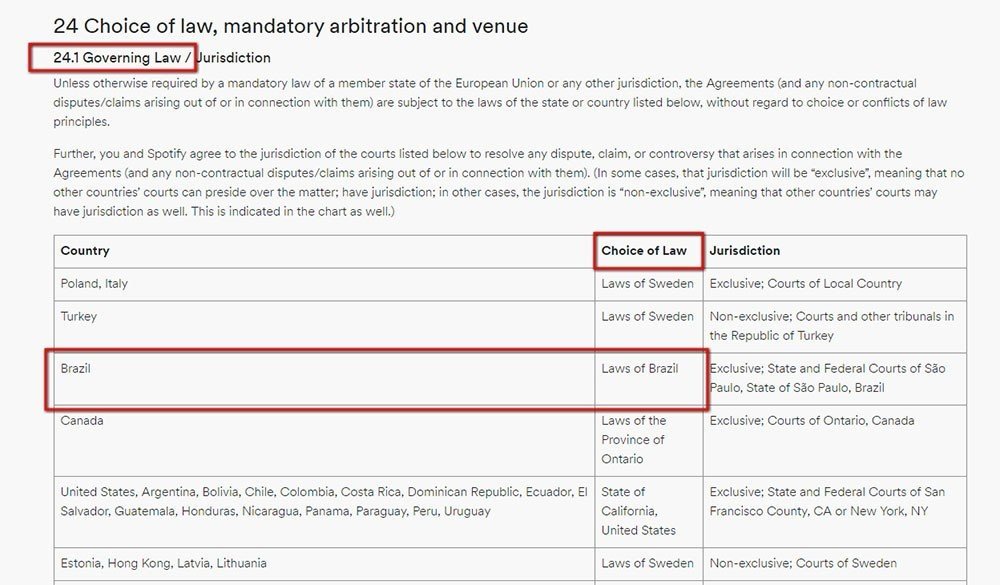
Note how this chart really helps both the business and the user. The user can easily find what laws would apply to her case, while Spotify maintains incredible control over the choice of law on a global scale.
Zendesk includes a simple Governing Law clause that lets users know that section 18.1 of the Terms of Service contains details about governing law.

In section 18.1, Zendesk breaks down each of its services and provides basic information including a mailing address, contracting party information, and governing law information.
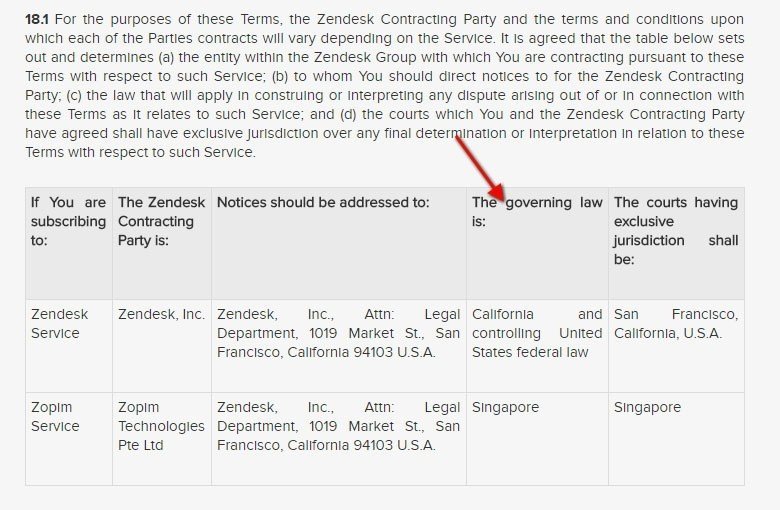
The Capital One Terms and Conditions agreement is short and to the point. In the event that there are any legal issues, between the company and a user of its services, Virginia state, law and U.S. Federal law will apply.

Another very concise and direct governing law clause can be seen in the MakerBot Terms of Sale. This clause is titled "Governing Law" which helps users locate it within the Terms.
In this clause, users are told that:
these terms and conditions and the transactions contemplated hereby shall be governed by, and construed and interpreted in accordance with, the laws of the State of New York, U.S.A.
The issue of jurisdiction is also addressed in the last sentence where MakerBot states that:
any action seeking legal or equitable relief arising out of or relating to these Terms or the Manual will be brought only in the courts of the State of New York or the United States District Court for the District of New York.

The same concept applies no matter what country you're in.
Here's how London-based news outlet The Economist keeps legal conflicts under English law by putting a governing law clause in its Terms of Use page:
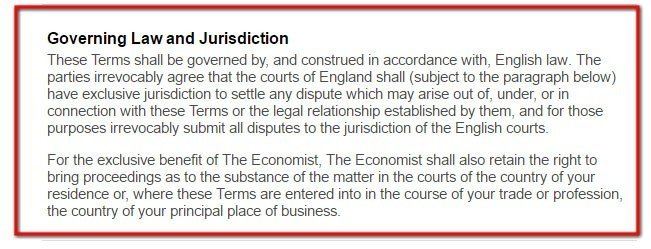
Tips for drafting a Governing Law clause
As you can tell from the examples, governing law clauses are pretty short and to the point but can still have some personalization and variety.
Here are a few basic tips to keep in mind when you go to create your own clause.
- Keep it simple.Clarity is always important in legal agreement clauses, and there's no reason you should over-complicate this by-nature basic and clear clause.Just let your users know what law will govern. Something as simple as, "All legal issues arising under these terms will be governed by Texas law" is sufficient.
- Pick wisely.Remember, different laws can benefit you in big ways.When choosing which law will govern, choose one that has laws in your favor that will work to your benefit. It might not always be the obvious choice, either.
- Pick somewhere related.To make sure your clause will be legally enforceable, make sure you pick the laws from a place that is related to the transaction or to one of the parties.You can't just pick a governing law from somewhere where there's no connection between that place and your transaction.

Comprehensive compliance starts with a Privacy Policy.
Comply with the law with our agreements, policies, and consent banners. Everything is included.
